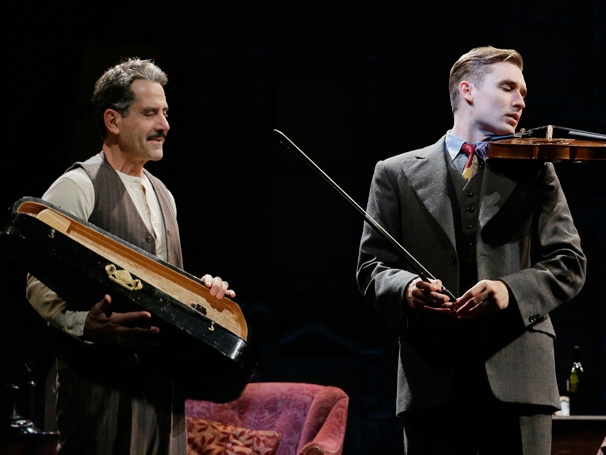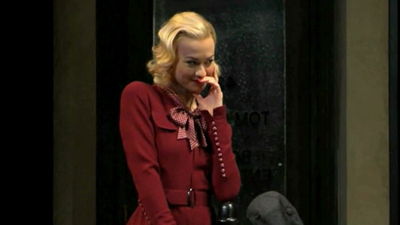

Lincoln Center Theater packs a wallop with Golden Boy at the Belasco Theater, the same venue where Clifford Odets’ neglected classic premiered in 1937. With a sure hand and skillful timing, director Bartlett Sher deftly conducts the sounds and sights of the fight game, focusing on inspiring talent instead of impressive names. A cast of 19 reenacts a familiar story with emotional performances and snappy street patter. With two intermissions, Golden Boy is a golden opportunity for theatergoers to watch one man battle the universal temptations in life.
The original Broadway production starred Luther Adler and Frances Farmer and a 1939 film followed, starring William Holden and Barbara Stanwyck. Later, a Charles Strouse and Lee Adams musical version featured Sammy Davis, Jr.
In this production, Seth Numrich (War Horse) plays Joe Bonaparte, a 21-year-old Italian-American, a talented violinist struggling with a visceral need to climb out of the poverty around him. He is faced with choosing to continue the music he loves or taking a chance on a prize-fighting career that promises wealth. Although his father (Tony Shalhoub), encourages his son to find the “truthful success” of a music career, Joe chooses to step into a tough crude fight world vastly different from his family.
Shalhoub, with an excessive Italian accent, plays Joe’s thoughtful father, an uneducated but wise man who keeps his old-world values illustrated by his evening conversations with his philosophical left-wing neighbor, Mr. Carp (Jonathan Hadary). The father doesn’t approve of Joe’s choice but follows his son’s progress, even going to the fights, not to watch but just to talk to Joe, who tells him, “You stand there like my conscience.”
Numrich portrays the gamut of emotions and conflicts within Joe. He is a cocky wannabe when he first persuades Tom Moody (Danny Mastrogiorgio) to manage his fighting career, but Numrich also shows Joe’s gentler side, particularly the radiance in his face as he holds his new violin, a birthday gift.
Joe’s arrogance escalates as his career builds. He falls in love with Moody’s mistress, a sharp tough-talking dame, Lorna Moon (Yvonne Strahovski) who claims she doesn’t want love, only numbness. Strahovksi, an Australian actress with a physical resemblance to “Mad Men’s” January Jones, assumes a credible New Jersey accent (she calls herself a “tramp from Newark”) and instills a vulnerability within her dead-pan shell. She senses Joe’s sensitivity and his love for music. He tells her, “With music I’m never alone when I’m alone,’” and she recognizes the brawling conflicts within him. Eventually, she admits her love for him. Danny Burstein gives a subtle performance as Joe’s trainer, Tokio, standing apart and observing, aware of Joe’s complications and how he’s being used. Tokio also understands his own role. When Joe emotionally breaks down before one fight, Tokio forcefully prods him to get into the ring. Later, however, Tokio warns, “Joe, you’re loaded with love. Find something to give it to. Your heart ain’t in fighting . . . your hate is.” Most of the cast is persuasive as secondary characters like Joe’s older brother Frank (Lucas Caleb Rooney), a union leader, devoted to the rights of workers rather than big bucks. Some performances, however, are slightly off-key, like Joe’s sister, Anna (Dagmara Dominczyk), and brother-in-law, Siggie (Michael Aronov), whose yelling onslaughts in Act One show more hysteria than passion. Anthony Crivello as smarmy hood Eddie Fuseli, is too exaggerated to be credible, with a big white topcoat draped over his shoulders and John Barrymore-poses like caricatures in a Noel Coward light romance.
There is the gray aura of a hard life in Michael Yeargan’s sets and props that speak for the scenes, like an upright piano in the tenement flat of a music-loving family and Moody’s well-stocked booze cart, ready for refills. Peter John Still and Marc Salzberg provide realistic sound effects and between scenes, 1930’s jazz and big-band recordings keep the mood. Catherine Zuber’s costumes include a wardrobe tailor-made for Lorna Mood, a ‘30’s career girl/mistress with a thing for clothes. She is perfect from hats to seamed stockings and laced-up shoes to die for.
In 2006, Lincoln Center Theater earned a Tony Award for the revival of Odets’ Awake and Sing!, also directed by Barlett Sher. Golden Boy, Clifford Odets’ first big hit and his most personal play, is another reminder of Odets’ expressive language and nuanced characters.
